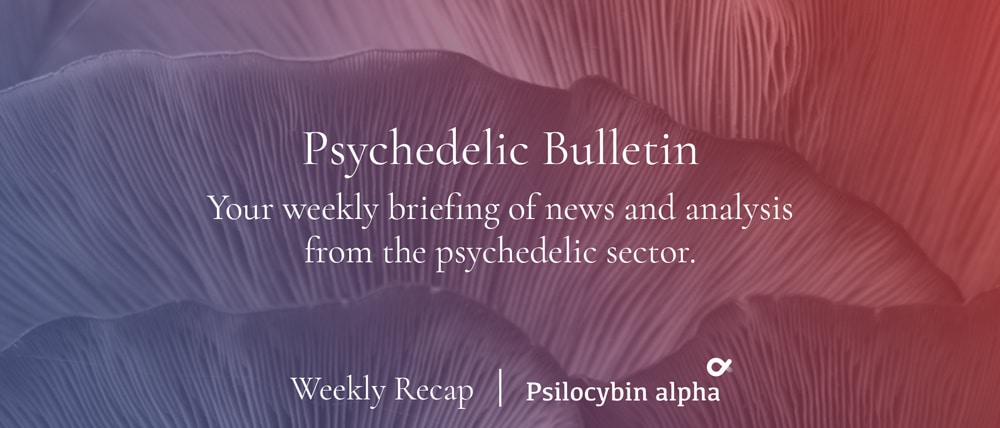In an earnings call earlier this week Compass Pathways confirmed that its heavily anticipated Phase 2b data is still expected to be shared by the end of the year.
Some attendees on the call asked for further information on an Opinion issued by the UK IP Office that found some of the claims in one of the company’s UK patents to be lacking an “inventive step.” CEO George Goldsmith emphasised the non-binding nature of the Opinion, and expressed that he remained confident in the defensibility of their patents. The very next day our Editor-at-Large Graham Pechenik identified that the company has secured a fifth patent: more below.
Elsewhere, we saw atai Life Sciences formally launch Revixia Life Sciences, which aims to develop Salvinorin A for the treatment of various mental health disorders.
Psychedelic Sector News
Compass Pathways Scoops Fifth U.S. Patent
Yesterday, Psilocybin Alpha’s Editor-at-Large Graham Pechenik broke the news of Compass Pathways’ latest published patent application, which was filed on April 13th and allowed on August 3rd, 2021. When the patent issues, it will become the company’s fifth patent in the U.S.
As a reminder, Compass’ first three U.S. patents generally cover Polymorph A for the treatment of drug resistant depression and major depressive disorder (MDD), while the fourth covers a different solid form called Hydrate A. This latest patent, meanwhile, has claims to methods of treating treatment resistant depression (TRD).
Beyond a differently phrased target indication, this fifth patent has a potentially significant difference in wording, as pointed out by Pechenik:
Earlier Compass patents claim administering “a therapeutically effective amount of crystalline psilocybin in the form Polymorph A”
This patent claims administering “a therapeutically effective amount of psilocybin…wherein the psilocybin comprises a crystalline Polymorph A”
This begs one to ask the question:
Is there a difference between administering a therapeutically effective amount of
— Graham Pechenik (@calyxlaw) August 12, 2021
–crystalline psilocybin Polymorph A
–psilocybin that “comprises a crystalline Polymorph A”?
Does the latter include *any* psilocybin composition having a measurable amount of Polymorph A?
6/6 pic.twitter.com/TiWEP0quhn
atai Launches Revixia to Develop Salvinorin A
Yesterday, atai Life Sciences formally announced the launch of Revixia Life Sciences. We say ‘formally’ because the program was outlined in public messaging prior to yesterday’s press release, including in atai’s S-1 filing in advance of the company’s IPO (note: three members of the Psilocybin Alpha team discussed the filing’s contents, including Revixia, on Business Trip in June).
The wholly owned subsidiary will develop Salvinorin A to treat “a variety of mental health disorders,” according to the release. The molecule is derived from Salvia divinorum, a plant from the mint family that has long been used in spiritual and curative treatments by the Mazatec people.
Prominent psychedelic researcher Bryan Roth expressed doubt over the potential therapeutic value of Salvinorin A, exclaiming:
I'd be very surprised if salvinorin A has any real therapeutic benefits...but who knows? https://t.co/J7fJ1siyro
— BryanRoth (@zenbrainest) August 12, 2021
Roth’s opinion is especially salient as it was his lab that discovered the drug is a potent kappa opioid agonist, and also found that Salvinorin A “had no actions at the 5-HT2A serotonin receptor,” which is the primary target of classical hallucinogens such as psilocybin and LSD.
atai expects to begin clinical trials in the second half of 2022.
Other Headlines
- Bexson Biomedical launches new project to apply subcutaneous delivery technology to multiple psychedelics;
- Clerkenwell Health partners with CRO to advance psychedelic clinical trials;
- Compass Pathways announces Q2 financial results and business highlights;
- MindMed appoints Dr. Robert Dworkin to Scientific Advisory Board; announces Q2 financial results;
- Psilera initiates preclinical studies of NCEs aimed at reducing alcohol consumption.
Weekend Reading
Tripping Together
A long-read in NEO.LIFE explores the benefits and drawbacks of group psychedelic therapy, with comment from experts including UCSF’s Josh Woolley, Johns Hopkins’ Roland Griffiths, and MAPS’ Rick Doblin.
Human interactions in psychedelic therapy have just as much if not more of an impact on the outcome of your therapy as the drugs themselves. Most psychedelics such as LSD and psilocybin (the active ingredient in magic mushrooms) act on serotonin 2A receptors in the brain, and the net effect is roughly the same (amplified emotions, ego dissolution, visions). But who you take them with and where—a therapist you trust in a clinic, your friends you adore in your home, or thousands of sweaty strangers at a rave—will lead to vastly different experiences and outcomes.
Join us on Twitter
How magic mushroom ingredient psilocybin helps patients with depression or PTSD change how they feel, by rewiring the brain with more connectionshttps://t.co/XbyjVGqQd9
— Psilocybin Alpha (@PsilocybinAlpha) August 12, 2021
Weekly Bulletins
Join our newsletter to have our Weekly Bulletin delivered to your inbox every Friday evening. We summarise the week’s most important developments and share our Weekend Reading suggestions.
Live Updates
Join us on Twitter for the latest news and analysis.
Other Channels
You can also find us on LinkedIn, Instragram, and Facebook.


